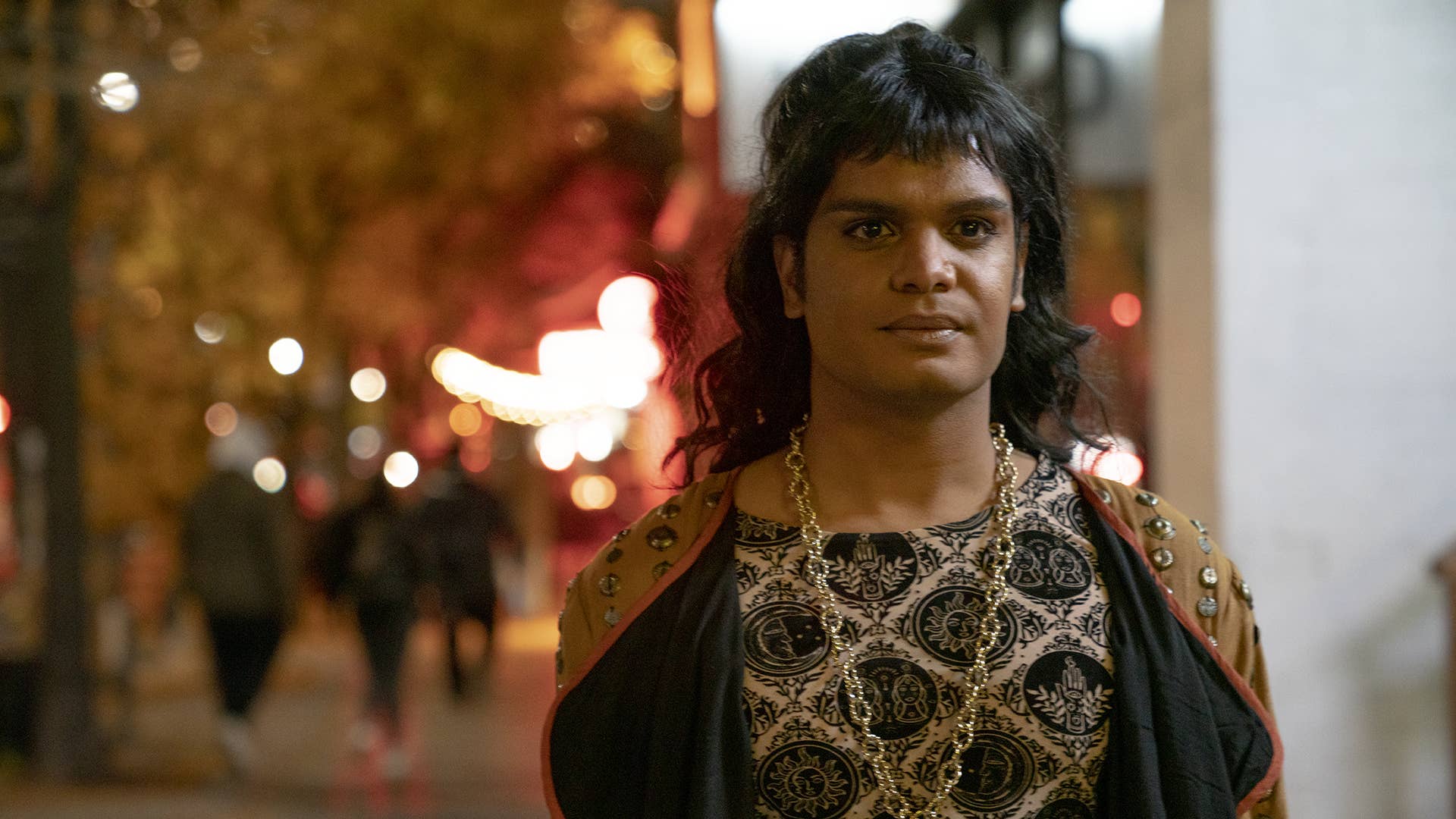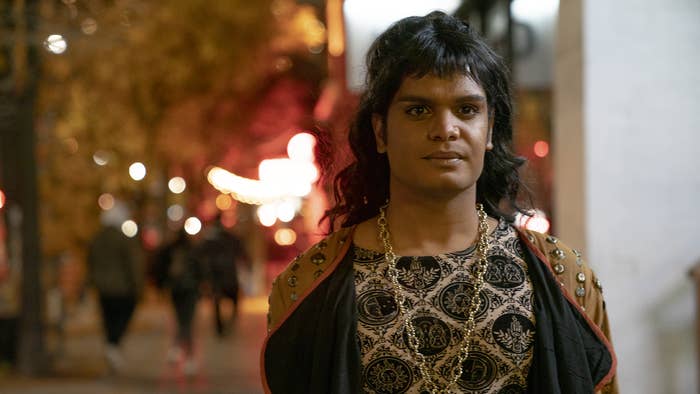
Mississauga-born actor and playwright Bilal Baig is making history with the CBC series Sort Of as they become the first South Asian, queer Muslim actor to star in a Canadian prime-time TV series.
Previously, they were most known for writing the 2018 play Acha Bacha, which explored the intersections between queerness, gender identity and Islamic culture in the Pakistani diaspora. They later met Queer As Folk alumnus Fab Filippo while working on a play together.
Co-created by Baig and Filippo, the series follows Sabi, a gender-fluid Pakistani-Canadian millennial (played by Baig), who works as a nanny for a family in downtown Toronto while also bartending at a queer bar and has recently broken up with their cis male boyfriend. The eight-episode comedy series is available to stream now in Canada on CBC Gem and will broadcast on CBC TV starting today (Nov. 9).
Representation behind the scenes in the writer’s room and at the executive level is just as important as on-screen opportunities to be seen and heard, and Sort Of is proof that it works. The coming-of-age story, which was filmed in Toronto, is certainly a new milestone when it comes to Canadian TV and Baig is proud of it. We caught up with the actor who hopes it gives viewers a chance to talk about the show with family and friends and be entertained at the same time.
You are the first South Asian, queer, Muslim actor to star in a Canadian prime-time TV series. Although delayed, I’m glad it’s finally happening. How does it feel and what does this recognition mean to you?
It’s a good question. There are so many different parts to it. One of the things that’s totally true is that I wasn’t super connected to consuming television. I was born here, but we just watched Bollywood movies for my whole childhood well into my teen years. So I wasn’t tapped into what I wasn’t seeing. For a very long time, when I was much younger, I thought every actor was South Asian and brown skin, because that’s all I was seeing when we would all come together to watch these movies.
I recognize the weight and the responsibility of it now. To me, I’m really interested in having a really nice relationship to my mental health. What that means is that I don’t spend sleepless nights worrying whether I did a good job, or I did it right. I don’t think that there’s a way to do these things right. I think we have to follow our hearts and intuitions and of course, the team I got to work with was wonderful in every sense of the way—from the producers who cared so deeply about honouring the material and the tone, and not ever sacrificing integrity for a big laugh out loud joke, but actually always going to the truth. I know myself and Fab, my co-creator, were interested in that too. And that extended to the writers room that we had, which also had multiple South Asian folks in the room and people who are queer as well.
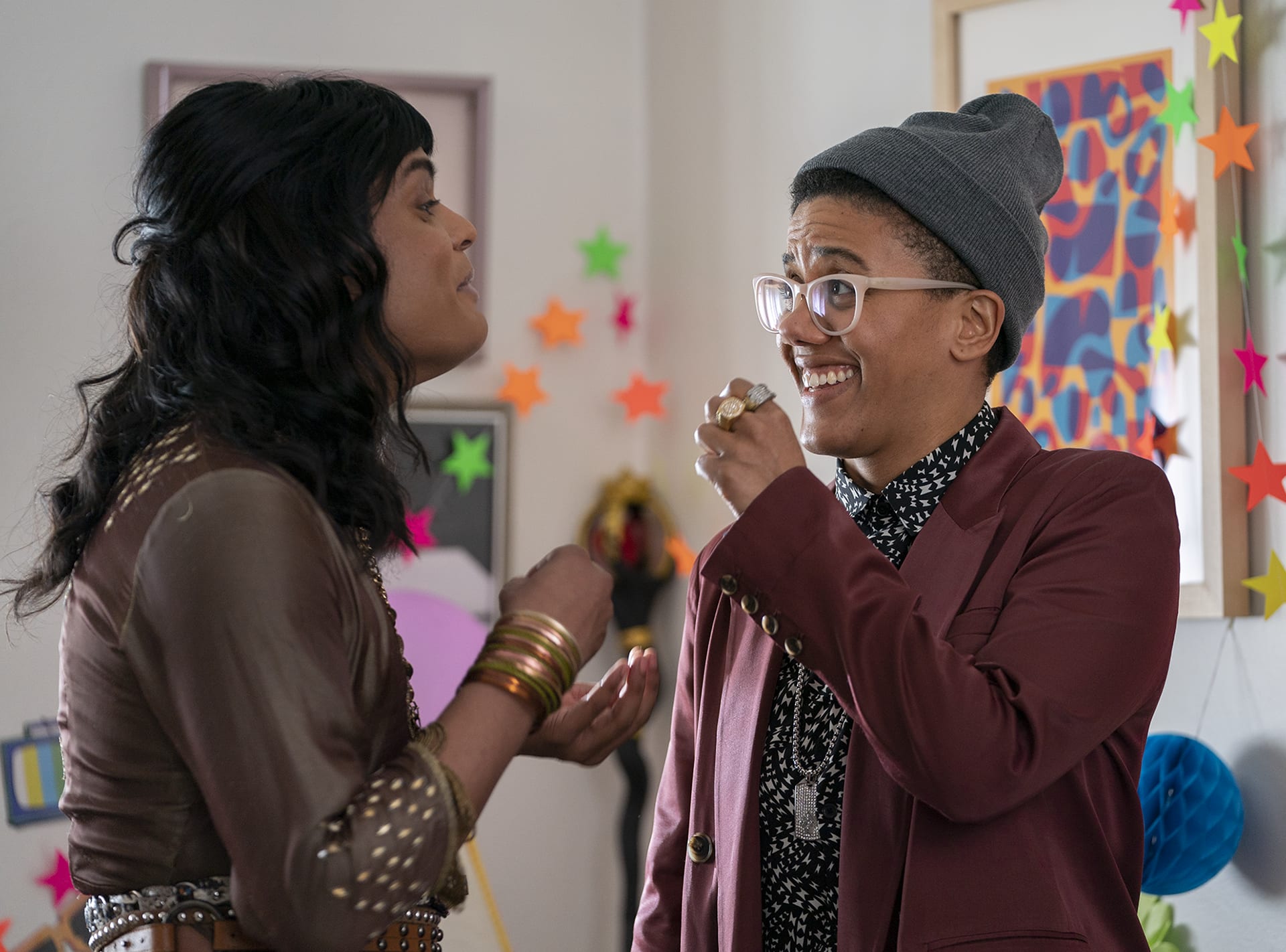
“I really hope this is a moment where we can recognize not only the power of a character like Sabi existing on screen, but what it means to involve a queer, trans-feminine brown person in an executive position on a TV show.”
So there was just a lot in place that never made me feel like everything was on my shoulders. I think that’s a new refreshing story too, because I think we’ve heard in the past, certain creators, especially who hold multiple identities, are tasked with getting everything right all at once because they’re the only voice who’s coming from that experience. And we also worked with four different trans consultants, all on the spectrum of trans. So I also didn’t have to carry that with me, I knew we were in conversation with other people who are going to inform the story.
I really hope this is a moment where we can recognize not only the power of a character like Sabi existing on screen, but what it means to involve a queer, trans-feminine brown person in an executive position on a TV show, to be a part of ensuring an authenticity in the voice of the show. I think that’s what we need more of. Of course, the representation on screen, we can keep going further and further and that’s very exciting. But I think we really need to be asking ourselves who is part of the big decision-making process on these shows behind the scenes.
Your comic timing and that deadpan delivery of dialogue is incredible. I loved it! What did you love most about your first foray into TV?
Thanks for saying that. That’s really nice. I know I’m going to just sound a bit like a broken record but that cast is next level and there was an instant chemistry with so many of the people involved. Two of the actors—Amanda Cordner, who plays the best friend 7even, and Ellora Patnaik, who plays the mom—I’ve known them for seven or eight years so I had gone into it knowing there were already going to be people who I knew. But the surprise was so many of the other actors who I didn’t know as well.
There was something about everybody really coming to work, wanting to honor the story. I think the story touched so many of the people who worked on the show, not just cast, but crew and producers too. So anytime we were talking about this world, or building it, there was a deep commitment to honoring it. And I think that helped. In the performance, I could relax, knowing that nobody was calling it in, nobody was there for a paycheck. There were people who were like, “I’m here to try everything under the sun to make this show happen.” That’s really moving as the person who also co-created it, because you don’t know whether these things will actually resonate or not, and I come from a lived experience that wasn’t, “Hey, Bilal, tell every story you want. We love your voice.” I was hearing the opposite of that for many years. So there was a lot of fear and hesitation on my part. I think what really helped me ease into it was, again, the people around me who just were like, “We just want you to bring your heart into this as much as you can” and that’s a lovely thing to be invited to do.
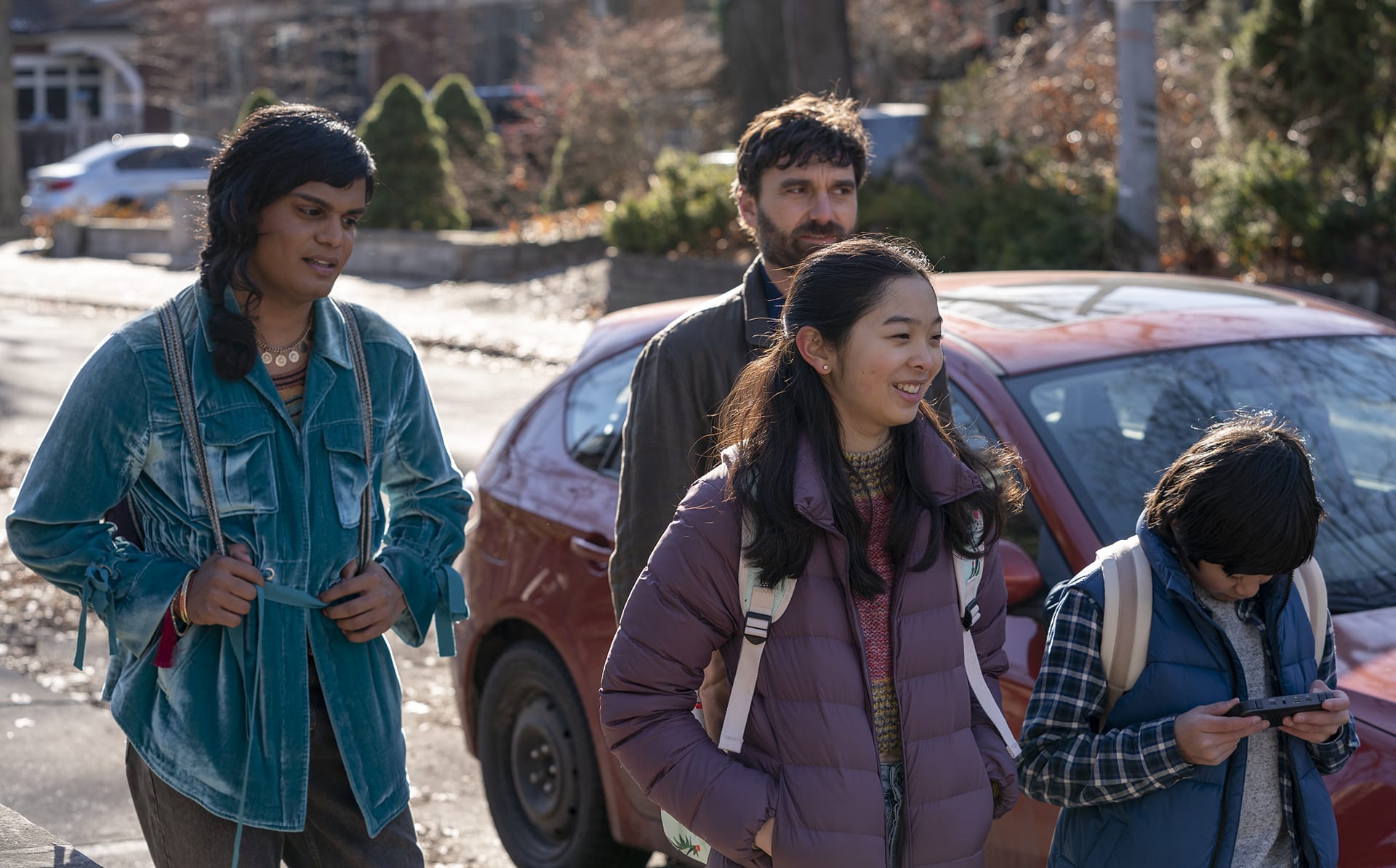
People often tend to think that marginalized artists are one in the same with their on-screen persona. What attributes in Sabi did you pull from your own personal experiences and how much did you want to keep that distinction?
Yeah, I love this question. I’m so glad we’re talking about this too, because we need to start to really enforce that people who have multiple identities have creative capacity and imagination and that we’re not just pulling entirely from our lives. I mean, that’s a fine and fair way to do it. I think there is such nuance there. For me, it was exactly that, it was a mix of, I think, there’s a guardedness that Sabi and I share about existing in the world and not trusting that we will always be safe or cared for or respected. I think that does a lot to somebody’s psychology and how they exist in the world. So I knew that I could really bring that, but the differences are also kind of in that same world. When we broke in the writer’s room, that this part of Sabi, that they went to electrician school, that was a big key in me starting to really see some differences between myself and that character because I went to art school, I got to kind of be free and express myself and find my kind of creative voice and, Sabi went down a different path of continuing to repress themselves and shrink and hide the things that make them who they are and that changed everything for me in terms of their body language, the tone of voice, that delivery.
I think this is somebody who’s detached themselves from the world, and is constantly making a commentary about what they’re seeing and these kind of relationship dynamics, and at the same time, possesses like a whirlwind of emotions, that I think they do learn without giving anything away over the course of the first season, how to express themselves in that way, but it’s so locked. That was a major difference and I loved finding that because it really helped me distinguish myself from that character. It’s a really worthy story to look at. Why has someone become so shut down, locked and guarded? And what would it take for that person to crack open a little bit? I would love to be in service of a story like that.
When Fab came to you with the idea of making this, your big question was, “Why collaborate with a straight, cis, white male?” How did he pitch you a better story that made you want to collaborate with him?
He talked about his own personal transition that he was navigating… a thing in his life that was really changing how he was looking at the world, how he was looking at his own relationship to himself , to his family, to his child. There was such a power in a cis person using the word transition, without any sort of taboo, stigma, like, “Oh, I can’t say that word, that word is for only one community in particular.” There was also an understanding that, of course, our transitions are different. Of course, we’re not trying to say, “Hey, we’re all the same.” I don’t think that exists in the show at all. There was a real power in acknowledging that it’s a human experience to evolve. And we, the more we all embrace it, the better we all are. I think there’s a power in being like, ‘Yes, I’m going to change, two minutes from now, five years from now.’
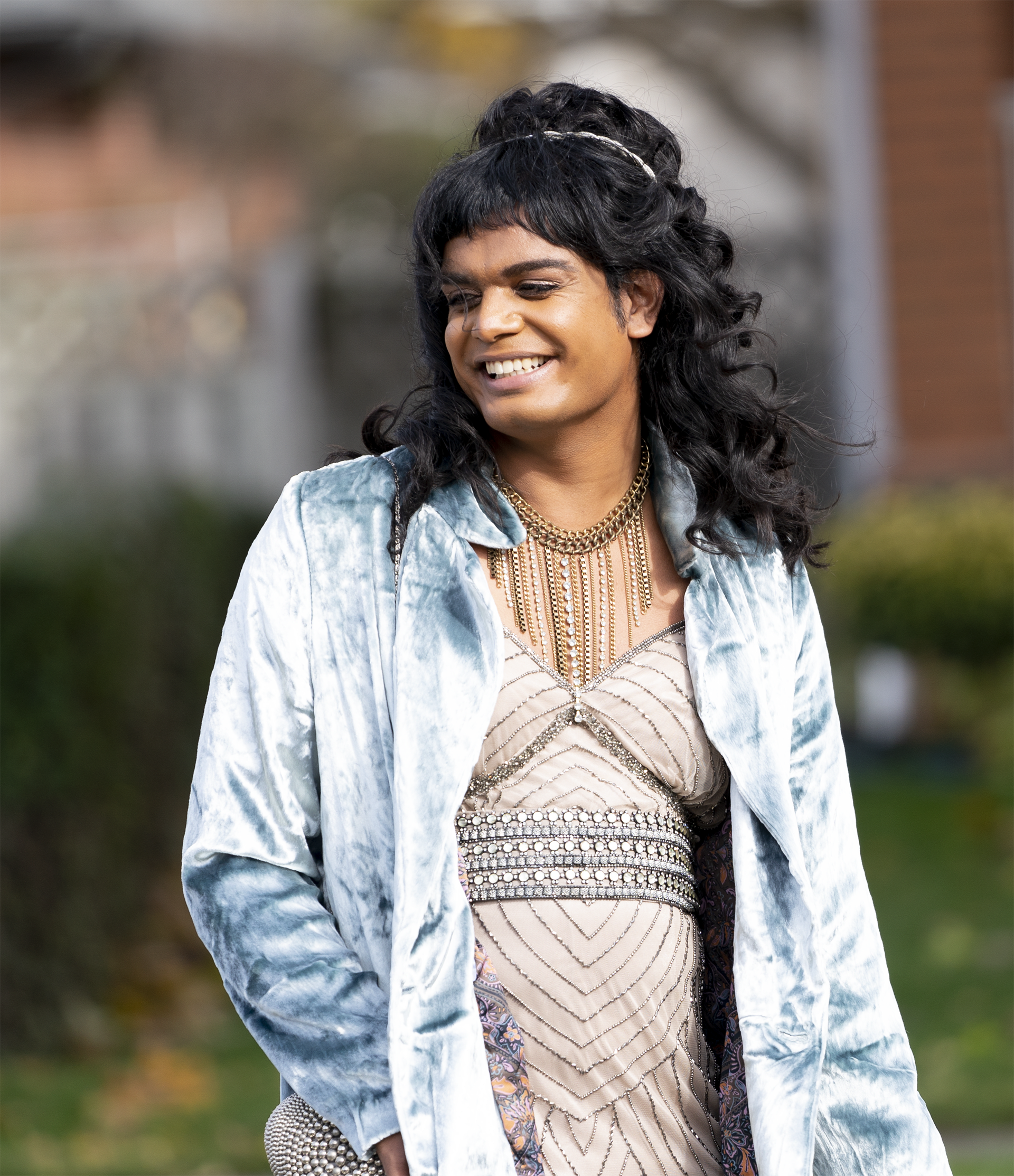
“I come from a lived experience that wasn’t, ‘Hey, Bilal, tell every story you want. We love your voice.’ I was hearing the opposite of that for many years.”
It was with that, where we started to look at all the characters through that lens, like what is each of these characters’ transitions? That really did it for me. I got very emotional because it also meant that if we can put work out into the mainstream like this, we really are at least evoking some conversations on what it means to evolve. And I think what that does is it helps build empathy for trans and non binary people, because we’re seen as the ones who evolve and transition in very particular ways. But when we can all kind of tap into that for ourselves, I think trans and non binary people start to feel less like outsiders. And actually, we are among everybody else. There’s such power in that. That changed it for me.
There are so many harmful representations on-screen of how trans people live their lives. I love that this series doesn’t perpetuate any stereotypes, it’s just an authentic story. How did you best want to honor Sabi and showcase an authentic story?
One of the things I remember saying early on in the writers room was, “Let’s not make this character like classic sassy with the finger snapping and the hands on the hips and a super kind of like, snatched like wardrobe style.” I think Sabi is interesting and compelling. Their beauty actually is in them figuring themselves out, and the different worlds that they’re a part of really dictate how they operate, what they choose to wear, and I think that was really important that we do see somebody who’s a bit on the quieter side of life and a bit reserved. I think that’s so beautiful to see and especially in a comedy. The thing that I felt was also really important was to see someone really compartmentalize their life. I think that’s very true for folks who are at the intersection of multiple identities, and then to watch those worlds start to collide in on each other and mix and what that does for that character. I thought that felt important.
I really liked when you flipped the script on its head and Sabi’s cisgender boyfriend claims that he doesn’t feel seen. That was a very interesting turn of events. Was that something important to you to explore?
Yes, totally and it’s important look at the layers of it too because in no way is that actor playing it for the jokes, you know, a white guy being like, “You don’t see me.” I think he actually doesn’t feel seen and I think that it speaks to the kind of climate that we’re in. As the person who played Sabi, I think Sabi getting the gift with the concert tickets and the restaurant that they’re at is on King West, so it’s like super straight and cis. I think Sabi made choices to try to let the boyfriend know that they are seen by Sabi and yet it still doesn’t work. I really wanted to explore the nuance of what it means to be seen, how you can feel seen by somebody else who’s so different from you and you’ll notice through the full season this year we really do come back to this idea of being seen and what that actually feels like and how that can change everything for you if you’ve gone so long not being seen.

